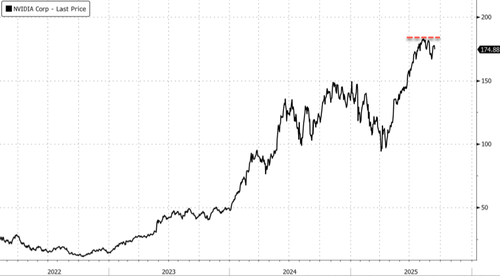Beijing Bans Alibaba, ByteDance From Buying Nvidia’s Custom AI Chip
China’s Cyberspace Administration (CAC) has barred Alibaba, ByteDance, and other tech firms from purchasing Nvidia’s AI chips, including the RTX Pro 6000D custom-built for the Chinese market. The timing underscores the ongoing Sino-US trade spat and tech showdown, as President Trump pushes to force a sale of China-associated TikTok to a U.S. company. Later this week, Trump is expected to speak with Chinese President Xi Jinping, with trade and the fate of TikTok likely on the agenda.
The Financial Times reports that the CAC is going beyond earlier restrictions on Nvidia’s H20 chip. The curbs now extend to the RTX Pro 6000D, forcing major Chinese tech firms to abandon their planned large orders.
People familiar with the situation said some tech firms had tens of thousands of the RTX6000D, designed mainly for AI inference tasks, in the order pipeline. Regulators have concluded that domestic chips achieved the same performance as that of Nvidia’s model.
On Monday, China’s State Administration for Market Regulation (SAMR) ruled that Nvidia violated anti-monopoly laws. While SAMR provided few details, the ruling stems from an antitrust probe that began with a preliminary investigation in 2020.
By Tuesday, the SCMP reported that the RTX6000D has so far received muted demand in China. JPMorgan told clients last month that it expected some 1.5 million RTX6000Ds to be produced in the second half of this year, while Morgan Stanley predicted in July that Nvidia would have 2 million RTX6000Ds in its pipeline.
The RTX 6000D is based on Nvidia’s latest Blackwell architecture with conventional graphics double data rate memory and a memory bandwidth of 1,398 gigabytes per second, just below the 1.4 terabyte threshold set by the U.S. in April. It was developed in part to fill a void left by the H20, which was banned from sale in April before that decision was reversed.
What’s clear is that Beijing is putting pressure on Nvidia ahead of the Trump-Xi talks later this week – think of it as a form of leverage.
Nvidia CEO Jensen Huang expressed disappointment but acknowledged the geopolitical storm, noting that Nvidia can only serve markets where it’s welcome.
“We can only be in service of a market if the country wants us to be,” Huang told reporters in London. “I’m disappointed with what I see. But they have larger agendas to work out, between China and the U.S., and I’m understanding of that. We are patient about it.”
Shares of Nvidia are down 1.5% in premarket trading in New York. On the year, shares are up 30%. The chart below shows that upside price action has stalled since mid-August. The $180 level is the current resistance.
. . .
Tyler Durden
Wed, 09/17/2025 – 07:20ZeroHedge NewsRead More






 R1
R1
 T1
T1


